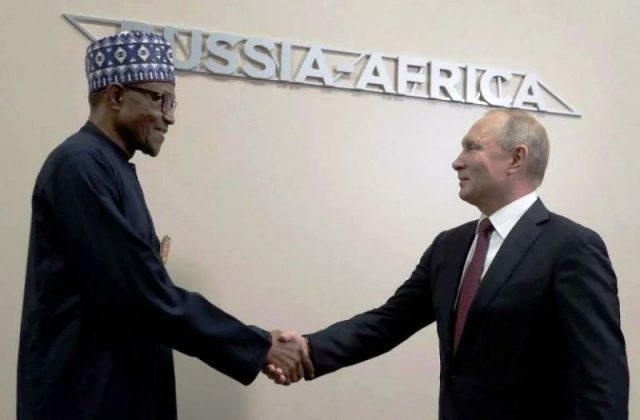TUE 01 MARCH, 2022-theGBJournal- The Russian invasion of Ukraine has profound and multidimensional implications for the Nigerian economy, especially if it gets protracted. These include the escalation of energy prices (diesel, aviation fuel, kerosene and gas), mounting petrol import and subsidy bill and the aggravation of petrol smuggling.
There are also significant macroeconomic outcomes which include heighten fiscal deficit, growing debt levels, spike in debt service payments, money supply growth, exchange rate depreciation and more intense inflationary pressures. Additionally, the cost of flour, price of bread and other confectioneries may also take a hit.
The summary is that if the conflict is protracted, these would be the downside risks to the Nigerian economy.
Higher Energy Cost:
Russia is the second largest producer of oil globally, even ahead of Saudi Arabia. It produces 10 million barrels per day. There is a good chance that the conflict in the region would disrupt oil supplies, reduce output and trigger higher prices. Already, oil price is above $100 and the impact on energy prices is already being felt around the world.
In Nigeria, the deregulated components of petroleum products would witness sharp increases. These include diesel, aviation fuel and kerosene. Gas would suffer the same faith.
The escalation of these costs obviously has serious inflationary implications across sectors. The geopolitical tension of the recent weeks had actually bolstered energy priceseven before the current onslaught by Russia. The situation may get worse if the conflict escalates. This would affect cost of production, profit margins, purchasing power and may further worsen the poverty situation.
Higher Fuel Imports and Subsidy Bill
We will see an upsurge in petrol import and subsidy bill in coming months as the landing cost of petrol increases on the back of the rise in crude oil price. Regrettably, we remain a major importer of petroleum products and typically when oil prices increase, petrol import bill and subsidy payment also increase. Only recently the NNPC made a request of N3trillion for petrol subsidy. With current turn of events, the subsidy bill would even be higher, creating serious fiscal challenge for government at all levels. These of course have serious implications for the budget and government finances.
Smuggling of Petroleum Products
The scale of petroleum products smuggling will increase because of the impact of the crude oil price hike on relative prices. The price differential between the cost of petrol in Nigeria [which is heavily subsidized] and the cost of petroleum in other countries in the sub region would be further widened, fueling more petrol smuggling. Therefore, the current domestic petrol consumption estimated at60 million litres per day is likely to further jump as the current developments provide even greater incentives for smuggling. That will put further pressure on the NNPC for petroleum products supply for domestic consumption. This may perpetuate the current scarcity and fuel queues beyond initial expectations.
Fiscal Operations of Government
Ideally, high oil price increase, should be good news for oil producing countries. It typically impacts positively on foreign exchange earnings, foreign reserves and government revenue. But Nigeria is a peculiar case because of the dysfunctional policies and regulations in oil and gas sector. It is an irony that crude oil price increase emasculates the Nigeria economy, rather than benefit it. This is because of the escalating petroleum products and subsidy bill. Consequently, fiscal deficit will be higher than projected, debt profile will increase, debt service commitment will rise and government borrowing will intensify. This may worsen an already weak fiscal space.
With this scenario, we are likely to see an increased credit to government by the Central Bank of Nigeria, which will further increase money supply leading to higher inflation and further depreciation in the exchange rate. These are the regrettable fiscal trajectories of the current developments. We are likely to see a much more fiscal pressure on all levels of government.
Effect on trade
Bilateral discussions between the federal government and the Russian government on the resuscitation of Ajaokuta Steel Plant by the Russians had progressed significantly before the pandemic disruption. This conflict may cause a major setback to this agreement because of the torrent of sanctions against Russia. Nigeria also imports substantial amount of wheat which would also suffer some disruption and impact on prices.
Impact on federation account
The revenue allocation to the different levels of government may be adversely impacted because the substantial amount of NNPC’s resources will be consumed by the mounting subsidy payment in the unfolding scenario. Therefore, we may be on the verge of zero remittance by the NNPC to the federation account as a result of the rising subsidy commitment. This of course has grave implications for states, especially those that are heavily dependent on FAAC allocations. Their capacity to meet their obligations will be impaired. Their ability to pay salaries, pensioners, fund infrastructure, pay contractors will be weakened.
However, on the flip side, there is a positive investment effect on companies in the upstream segment of the oil and gas sector. This is good news because there is a positive correlation between crude oil price and returns on investments. It is expected that oil service companies should also be positively impacted.
Implications for global economy
Because of the strategic role of Russia in the global oil market and the global energy market, energy cost will increase globally and this will further worsen the challenge of inflation that many of the advanced countries have been grappling with in the last couple of months. In Europe and America for example, inflation has reached levels that have never been experienced over the last thirty to forty years. This conflict will further exacerbate the global inflationary situation.
In same vein, Russia is the biggest supplier of gas to Europe. It supplies about 40%of the gas needs of European countries. These supplies will be disrupted which means that the cost of gas will increase, not just in Europe, but globally. This has grave implications for inflation in Europe as gas is a major source of energy. Global stock prices plunged, although there is a momentary recovery. But for as long as these conflicts and the barrage of sanctions continue, the resultant uncertainty would continue to dampen the prospects in global equities market and soften the pace of global economic recovery.
Implications for global wheat market
Ukraine and Russia are major producers of wheat. They account for about 30% of the global wheat export. Wheat is a major raw material for the production of flour which is used for bread and some other confectionaries. Therefore, the current development is going to disrupt the supply of wheat in the global market. There is therefore a risk of a hike in the cost of wheat which will affect the price of flour and a knock-oneffect on the price of bread and other confectioneries.
Effect on Global trade and investment
Generally, global trade will also be affected as Russia is also a major player in the global economy there are major investments owned by Russians across the world. There are financial transactions involving the Russian investors. There are issues of trade especially in the area of iron and steel for which both Ukraine and Russia are reputed. The iron and steel market are also going to be affected by this, we are therefore likely to see a spike in prices of iron and steel products globally.
There are also risks of cyber-attacks because Russia has very strong competencies in the cyberspace and if the situation degenerates we may see the deployment of cyber-attacks as part of the process of this war. There is also the frightening rhetoric by the Russian President of the possibility of deploying nuclear weapons. That again will further create more uncertainties and more disruptions in the global economy.
CENTRE FOR THE PROMOTION OF PRIVATE ENTERPRISE is a Nigerian-based non-governmental think-tank focused on promotion of private sector businesses
Twitter-@theGBJournal|Facebook-The Government and Business Journal|email: gbj@govbusinessjournal.ng|










